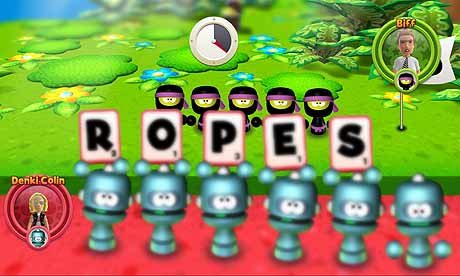
Some depressing news came in over the Easter break – Dundee-based developer Denki has been forced to downsize after failing to find a publisher for its excellent XBLA word puzzler, Quarrel. The company will now seek to self-publish its titles, but this will mean the loss of most of its staff as the studio streamines its operations down to a single development team.
On the Denki website, under the header, Black Easter Monday at Denki Towers, the company's MD, Colin Anderson, has written a impassioned blog post, criticising mainstream publishers for their conservative approach to commissioning new projects:
"Despite the game being finished, super polished, and everyone who plays it having great fun with it, we've slowly been remembering why we got out of the traditional games industry for so long and escaped to Interactive Television in the first place: this industry doesn't value good games. Players do, but the games industry doesn't. Instead it values low risk games – not even 'calculated' risk games, just low risk. And that leads to bogus sweeping generalisations such as 'Gamers don't play word games'.
"We've heard that from a lot of people, but never from the gamers who have actually played Quarrel and now can't wait to add it to their collections when it launches. We've also realised that if we continue to spend time looking for a publishing partner who believes us, then instead of releasing the game this year we'll almost certainly end up running out of cash."
During a period in which the casual gaming scene is undergroing explosive growth, at a time when companies like Popcap, Playfish and Zynga are effectively setting the agenda for mainstream game culture, it seems extraordinary that this has occured. Quite apart from the fact that veteran gamers DO like the occasional word game (the dedicated gaming press bestowed dozens of awards on emergent word puzzler Scribblenauts last year), when you have an enormous and voracious non-hardcore market opening up, does it really matter what core gamers think anymore? Sure, it does if you're releasing Triple A first-person shooters onto the Xbox 360 and PS3, but not if you're bringing out an offbeat, family-orientated puzzler on a digital platform.
Of course, if Quarrel wasn't a great game this would be just another sad story of a small studio going under in a hazardous business climate. But, as I discovered when I visited the company last year, Quarrel is lovely; an inspired and irresistable combination of Scrabble and Risk, immediately playable, but yet truly deep and expansive. I suspect, with the benfit of hindsight, Denki may have played things differently - it may have much sooner opted for the emerging model of self-publishing titles across XBLA, iPhone, Android, PC, Facebook and all the other digital platforms. But I've heard from a Denki spokesperson that the company was committed to pursue a publisher for this title, due to the way the project was funded. They were trapped into the traditional publishing model, and it has all but destroyed a development studio of considerable verve and stubborn individuality.
What message does this send out to other mid-sized developers looking to make a mark in the established games business? It says that there is a tear opening up in the heart of it all - as it has done in movies. At one end there are the massive, bloated, multi-million dollar blockbusters, and at the other, the little indie titles rapidly populating the new digital landscape. In the middle? Well in film that is now rom-coms, knock-off horror flicks and asinine thrillers. In games? Perhaps it'll be a lot of wannabe shooters, Wii family titles and licenses.
Of course, you may never have heard of Denki; you may fail to see why its misfortune can be extrapolated out to a significant industry event. But in some ways, Denki was Britain's answer to ThatGameCompany or Keita Takahashi. It should have been properly valued. Certainly, judging by the flood of sympathetic comments on its website, it was respected by peers. Paul Farley of nearby mobile and iPhone developer Tag Games wrote:
"Denki not only make truely innovative games they also do it quietly, with integrity and no little talent. The problem is clearly not the Denki 'product' but the broken games industry ecosystem. I know it's little comfort on a day like today but the publishers that have created and sustained this broken system are next in line."
Apparently, the Denki staff were told yesterday that almost 20 of them would be losing their jobs. They went to a nearby pub and a few of them hatched plans to set up in small independent teams, to complete some of the company's other forthcoming projects, or at least take its spirit into new ventures. We'll watch and hope.
While there is some optimism in the UK industry - the government's decision to look into tax credits for the sector may well improve matters (if it is ever realised) - stories like these hint at a deep malaise.

